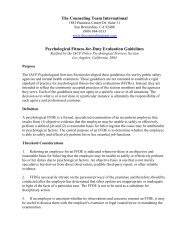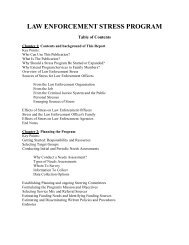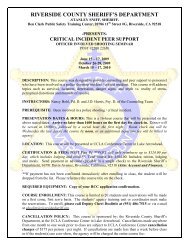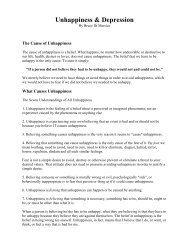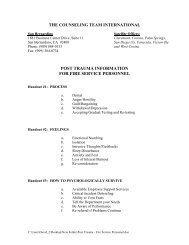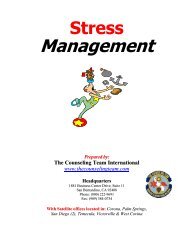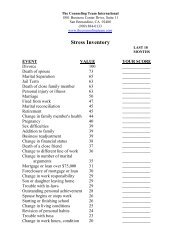ISSUES AND PRACTICES.pdf - The Counseling Team International
ISSUES AND PRACTICES.pdf - The Counseling Team International
ISSUES AND PRACTICES.pdf - The Counseling Team International
You also want an ePaper? Increase the reach of your titles
YUMPU automatically turns print PDFs into web optimized ePapers that Google loves.
Family Service Society's specific obligations under its contract with the department are to beavailable for 300 hours a year to--Provide three orientation sessions on stress prevention and program services fordepartment supervisors, union stewards, and line personnel.Provide a free initial visit and an evaluation session to any employee at no cost.Continue counseling on a sliding fee scale with third-party reimbursement.Be on call 24 hours a day to respond to emergencies involving personnel both on and offgrounds.Train, develop, and support at least six DOC employees a year to provide peer supportservices.Staffing<strong>The</strong> program has two supervisors. <strong>The</strong> Stress Unit's clinical supervisor is John Carr, FamilyService Society's executive director. Carr ensures that the services called for in the DOC contractare provided. With a master's degree in social work, Carr is tactical coordinator of the emergencyresponse unit for the Coventry, Rhode Island, Police Department, where he served previously asan active duty reserve police officer for 14 years. Carr provides the bulk of Family ServiceSociety's counseling and evaluation and, together with the DOC's program coordinator, hecoordinates stress services after critical incidents.<strong>The</strong> Stress Unit's coordinator is appointed by the DOC from among current peer supporters whoapply for the position. At this writing, the coordinator is Mark Messier, a correctional officer.Messier spends about half-time managing the Stress Unit's day-to-day operations within theDOC. Messier also recruits new peers and supervises current peers. Supervisors and peersupporters tell Messier about officers needing help. Officers in crisis may also call him directly.If the situation is not an emergency, Messier calls the appropriate on duty peer supporter toaddress the problem. If the problem appears to be serious, he handles it himself after gettingpermission to leave his post.Program services<strong>The</strong>re were 28 trained peers in 1999. Eighteen were uniformed, and 10 were civilians.Altogether, peers average 30 contacts a month on grounds or about 1 contact per peer per month.If a peer supporter talks with another employee three times and the person is still "stuck" on thesame issue, the peer calls Carr, who will evaluate and treat the person, refer the person to one ofthe two other Family Service Society clinicians or to an outside psychologist, or arrange forhospitalization. In 1998, Carr and his staff treated 17 employees and referred 12 forhospitalization. <strong>The</strong> agency uses a consulting psychiatrist to provide medical support andpsychiatric evaluations for officers whom Family Service Society treats on an outpatient basis.Normally, after the first contact with any Family Services clinician, either the person's insurancepays or the person pays out-of-pocket. (<strong>Counseling</strong> is available on a sliding fee scale.) Onoccasion, Family Service Society will provide long-term counseling services pro bono.




